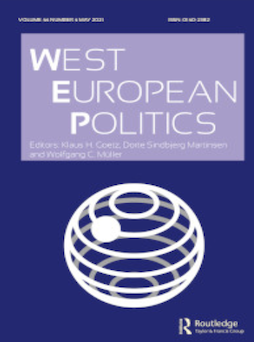Dolce far niente? Analysing non-compliance as a blame avoidance strategy
by Lisa Kriegmair, Berthold Rittberger, Bernhard Zangl, and Tim Heinkelmann-Wild
 The politicization of the European Union (EU) renders blame avoidance essential for governments, who are held responsible domestically for unpopular EU policies. We analyse one blame avoidance strategy – the threat of non-compliance –, so far overlooked by the literature, and gauge its effectiveness. We derive from scholarship on blame avoidance and compliance in the EU two conflicting expectations: according to the blame avoidance hypothesis, non-compliance should enable governments to shift the blame for unpopular policies to the EU; while according to the blame attraction hypothesis, non-compliance mobilizes constituents favouring compliance with EU rules, further reinforcing the blame targeted at the government. We test these hypotheses by analysing blame attributions in the news media covering the Italian government’s threat not to comply with the EU budget provisions in 2018. Our findings support the blame attraction hypothesis, suggesting that domestic compliance constituents can impede governments’ blame-shifting attempts.
The politicization of the European Union (EU) renders blame avoidance essential for governments, who are held responsible domestically for unpopular EU policies. We analyse one blame avoidance strategy – the threat of non-compliance –, so far overlooked by the literature, and gauge its effectiveness. We derive from scholarship on blame avoidance and compliance in the EU two conflicting expectations: according to the blame avoidance hypothesis, non-compliance should enable governments to shift the blame for unpopular policies to the EU; while according to the blame attraction hypothesis, non-compliance mobilizes constituents favouring compliance with EU rules, further reinforcing the blame targeted at the government. We test these hypotheses by analysing blame attributions in the news media covering the Italian government’s threat not to comply with the EU budget provisions in 2018. Our findings support the blame attraction hypothesis, suggesting that domestic compliance constituents can impede governments’ blame-shifting attempts.
In: West European Politics, Online First, https://doi.org/10.1080/01402382.2021.1909938.

